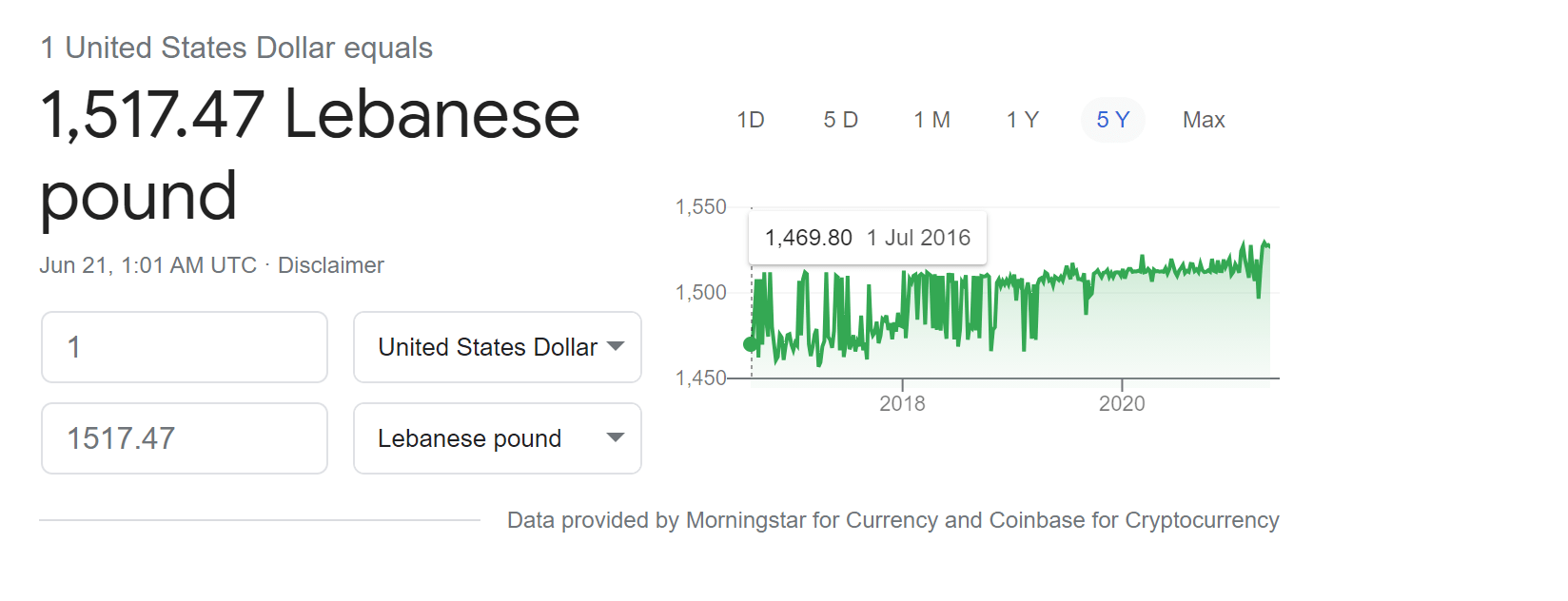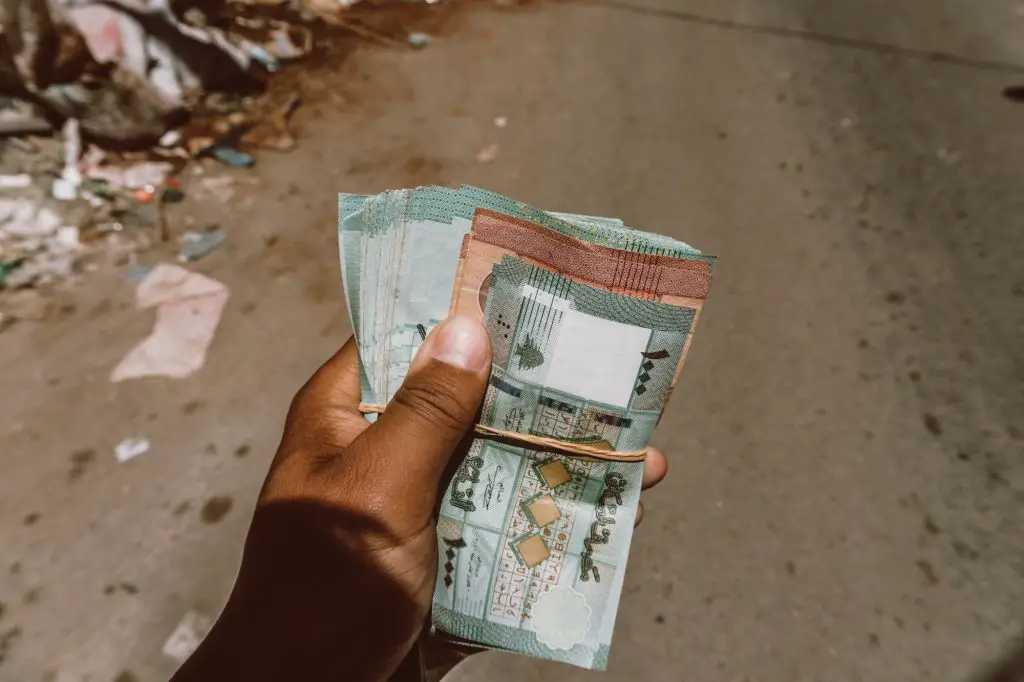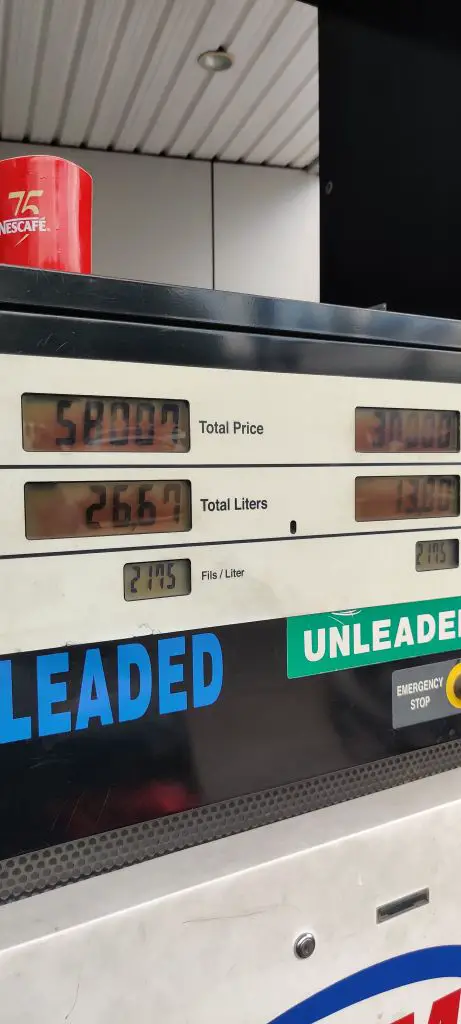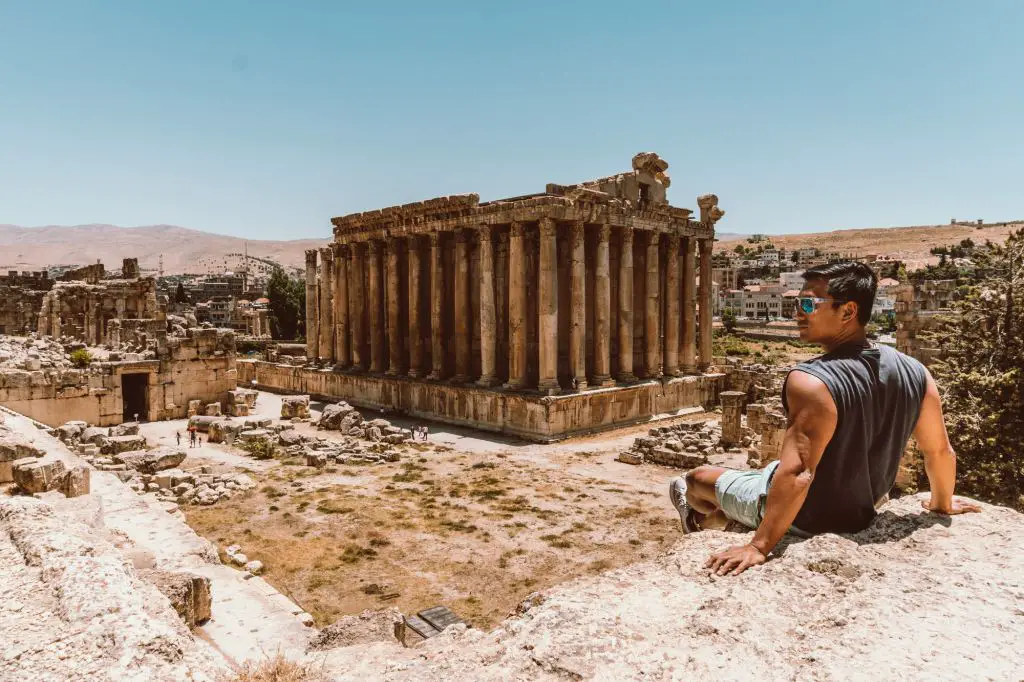Lebanon has gone through some radical and extremely unfortunate changes in the past few years. The economy is for a lack of a better word, in shambles. The currency has taken a huge hit and will continue to do so for the foreseeable future.
The Lebanese Lira or Pound (I found both to be used interchangeably but the lira is more prevalent) has weakened significantly versus the dollar in the past two years. However, the Government has kept the official exchange rate pegged and unchanged. Nevertheless, simple economics of supply and demand dictate that the Government can’t control the currency forever and that there is now a black market exchange rate dominating the Lebanese economy.
I spent two weeks traveling Lebanon in June 2021 and it was an absolutely amazing trip. If you’re planning to visit Lebanon in the future, absolutely make sure you understand the black market rate and what that means for your travels!
Disclaimer: This post was written in June 2021. The examples used in this post will almost certainly be obsolete in a few weeks time. The situation in Lebanon is very volatile with its economy so expect things to change daily.
What is the official exchange rate in Lebanon
The Lebanese Lira (or pound) started taking shape in 1924 and settled at around 3 Lira for one USD in the 1960s. In 1981, the dollar started to rise against the Lira, and it exceeded 2,800 Lira in September 1992. After that collapse, the dollar exchange rate began to gradually decline and pegged at the end of year 1998 at an average price of 1,507.5.
For twenty years, the lira stayed pegged to the dollar at the rate of 1500 to $1 and Lebanon enjoyed a solid period of economic growth. Investment flowed into the region and the country was on the up and up.
How Lebanon got away with pegging its currency to the USD is still beyond me as this is usually reserved for countries with a large percentage of their economy based on commodities like oil and gas which are dollar denominated. Lebanon had none of these things.
Starting in late 2019, the currency started to move against the Lira. The rate slowly i

What is the black market in Lebanon
The black market rate is simply the real exchange rate based on supply and demand. I won’t get into financial and economic theory because it would take up multiple posts. However, it’s simply to say that the Government has refused to lift the currency peg (since it has historically been pegged 1500 liras to $1 usd) but the citizens of Lebanon and the world know that the lira is no longer worth this price.

So if you understand basic finance, having a currency pegged to the dollar means it will never change its value. Lebanon’s Lira was always pegged at 1,500 to $1 usd. Other currencies like the Euro or British Pound fluctuate its value daily depending on what the market is doing.
The black market rate is what the currency is actually worth now. As of June 2021, the black market rate trades at 15,000 liras to $1USD. Yes, this is 10x what the “official” exchange rate is.
If you were to use a credit card or take money from an ATM, you would be charged the official exchange rate of 1,500 to $1 USD. Therefore, you would be losing out on 90% of the value.
Where to find the exchange rate?
If you go on any large financial website like Google or Bloomberg and look for the Lebanese exchange rate, it will only show you the official rate.
So you must look at other sites. There are many places to find the rates and my favorite source of the black market rate is on lirarate.org. I’m not sure exactly how the black market rate is determined but I’d guess it is just a survey of numerous black market dealers of what the current sentiment is.
How to exchange money on the black market in Lebanon
It is quite simply to exchange money in Lebanon. However, first thing is first.
You MUST bring in Cash
This means no credit cards, no checks, no nothing. Think of going back to the old days where cash reigns supreme. You need to bring good quality cash notes of US Dollars, Euros, Pounds etc. to Lebanon and exchange.
Preferably, you should bring in the bigger notes. $50 or $100 are the most widely accepted. Coins are useless so do not bother with coins of any currency.
Finding an exchange broker
The next part is a bit tricky. The official currency exchange shops located all around Lebanon cannot exchange money at the black market rate. This means you have to exchange money by other means.

It turns out that literally you can exchange money almost anywhere.
Having spent a week in Beirut, I was referred the number of a “broker” from a friend who would meet me to exchange cash. He literally drove around my apartment in his BMW and met me on the street. I gave him 300 euros and he gave me about 5.5 million liras in return in a big stack of cash. He was actually quite nice and told me that he’s been doing this since the beginning. Banks are a complete joke and he has a huge security lock box full of USD and Euro cash.
Go into any store and ask for the black market rate
I went to the local phone shop near my apartment in Mar Mikhael to get a sim card for my trip. As I was getting my phone set up, a random American tourist walks in and asks for the exchange rate. They said it was 14,500 to $1usd which was about 700 liras from where the rate was online. This is simply just the “fee” these shops take in order to generate a little profit.
Every shop will offer a slightly different rate so it’s just up to you what you’re willing to take.
Literally talk to anyone about exchanging money
I went to a bakery near my apartment in Mar Mikhael and like everywhere else I went in Lebanon, the people were extremely friendly and helpful. This was my first day in Beirut and I had no liras at this point. I asked the people that worked there where I could exchange money and got many different answers.
One of the customers, the head of the local police department, actually offered to exchange money with me at the black market rate. He actually gave me a better deal than what was quoted online. I exchanged with him 30 euros at a rate of almost 20,000 liras per Euro (the black market rate would have been around 18,000 at the time).
Turns out you can exchange money literally everywhere
It turns out that literally anyone with some cash wants to exchange money. It is hard to obtain dollars and euros in Lebanon at the moment so people are going to any lengths to get their hands on some. I ended up exchanging money at a cocktail bar, a winery in Zahle, and again with my black market broker during my stay in Lebanon.
You can literally exchange money anywhere, simply just ask them beforehand. Of course, know what the black market rate is at the day so you don’t get taken advantage of.
What currencies are accepted in Lebanon’s black market
The US Dollar remains king in Lebanon for now. Black market prices are always quoted in USD and you will always receive the best rates in US Dollars. However, living in Europe means I only have access to Euros. I could of course exchange Euros for US Dollars cash but most places take a 4-5% commission for this.
It was impossible to find information about exchanging non USD cash on the internet before coming to Beirut but now I have all the answers.
Euros are completely acceptable
If you are coming with Euro cash, it is completely accepted all over Lebanon. Dollars still reign king because that is what the economy is based off of but Euros are completely fine as well.
For exchanging euros, know what the official EUR-USD exchange rate is on the day, as well as the black market and multiple accordingly.
If the USD-LBP black market rate is 15,000 and the EUR-USD rate is 1.2, then that means you should get around 18,000 Liras to one Euro. Of course, each broker you exchange with might take a slight commission but you’ll just need to navigate accordingly. The guy I exchanged money with charged me about 1.5% off the EUR-USD rate which I was fine with.
British Pounds are also accepted
Although I did not have British Pounds with me on this trip, I asked around and these were also accepted.
What are the cost of goods in Lebanon now?
Now that you understand the Lebanese lira has devalued significantly, what about the prices of goods in the country? Well, as you’d expect, inflation has skyrocketed and the cost of goods, especially imported goods, has shot up through the roof for locals.
Locals are really being squeezed as their salaries have largely remained unchanged, but the cost of goods has increased significantly.
As of June 2021, the exchange rate is about 10x higher than it was before the start of it all. This does not mean as a tourist, things are 10x cheaper now. Prices in restaurants and bars have increased about 3x-4x to keep up with the inflation. Even so, prices have not kept up 1 for 1 with the currency depreciation so you as a tourist will be in an extremely advantageous spot. A simple coffee that used to cost 2,500 liras now costs 10,000 liras. This is 5x more than what you were paying two years ago.
If you’re a foreign tourist that can bring in fresh US Dollars to exchange on the black market, the price of coffee went from $1.6 to $0.6.
Lebanon is one of the cheapest countries in the world now
Having spent some time in Lebanon in 2021, I can safely say that Lebanon is among the cheapest countries in the world now. It used to be quite expensive to visit when the exchange rate was 1,500 liras to $1. I remember my friends telling me it was comparable to that of New York or London in terms of going out.

Nowadays, a cocktail at a high end cocktail bar runs for 40,000 to 50,000 liras. This is about $2.5 to $3.5 USD which is probably the cheapest prices you could find for a very high end cocktail in the world.
Again, keep in mind that things have gotten much more expensive for locals, and if you can bring in dollars, euros, or other currencies, you are effectively taking advantage of the economic plight (for better or for worse).




Hi, if im planning to travel to Lebanon and I would like to but like a Shawarma Wrap, can I pay in USD?
You can pay anything in USD really but it’s better to just pay in lira because people might take advantage of you with the exchange rates.
Hey, I was just wondering, how did you get the money to pay for a cab into the city from the airport? This whole guide is very helpful for figuring out how to get money once in the city, but I’m trying to understand how I’ll be able to pay for my Uber after I land. Do shops within the airport also function as black market exchanges?
Hey Zack, Uber is all with cash but if you just give them USD or euro cash to the equivalent black market rate they for sure will not say no to that. My Airbnb also just sent a gu yto pick me up and said it would be $10 which I had in cash
Hi! Very nice post. What did you do with your extra lira at the end of the trip? Will a bank give you the 1500 rate for it in return? (As a sort of arbitrage opportunity)
Hey I made sure not to have any liras at the end. I think you can exchange it back to USD on the black market and they’ll take a hefty spread, but for sure will be better than 1500
Would you happen to have your black market contact’s information available as i will be in beirut for an extended amount of time (a few months)? Thanks in advance
Hey Nick, this was my guy in Beirut +961 3 897 724. Not sure if he will still be in business but he served me well. Messaged him on whatsapp
So how much does a house in Lebanon cost? What about citizenship? Or a car?
I just got to Lebanon and just learned about the black market had I known the situation would have brought in more cash with me other. So was the few hundred Euros you exchanged enough to last you for the two weeks or did you have to exchange more money?
Hey mate. I think I exchanged about $700-800 total and this was sparing no expense.
Great information regarding black market exchange as well as general tips. Deciding between Lebanon and Ivory Coast for first week of September. Your blog has momentarily tipped the scales towards Lebanon 🙂
Hi Steven, glad you enjoyed the read and enjoy the trip! I’m curious what the black market rate will be like in two months!
This is so insightful, thank you. I don’t plan on going to Lebanon but I had no idea that a black market exchange rate was even possible and what it meant for a country’s government to pretend that everything is ok whilst its people earn less for the same value year-on-year…
5 minutes after reading your article, I was about to ask ‘do you think the country will collapse? has criminality increased?’ and I looked up Lebanon only to read that Lebanon is now a failed state 🙁
Hope you are all ok and safe
Hey mate glad you enjoyed the read! Yes i would say that most Lebanese would agree that Lebanon has become a failed state. However I did not feel like any criminality was present or felt unsafe at any point.